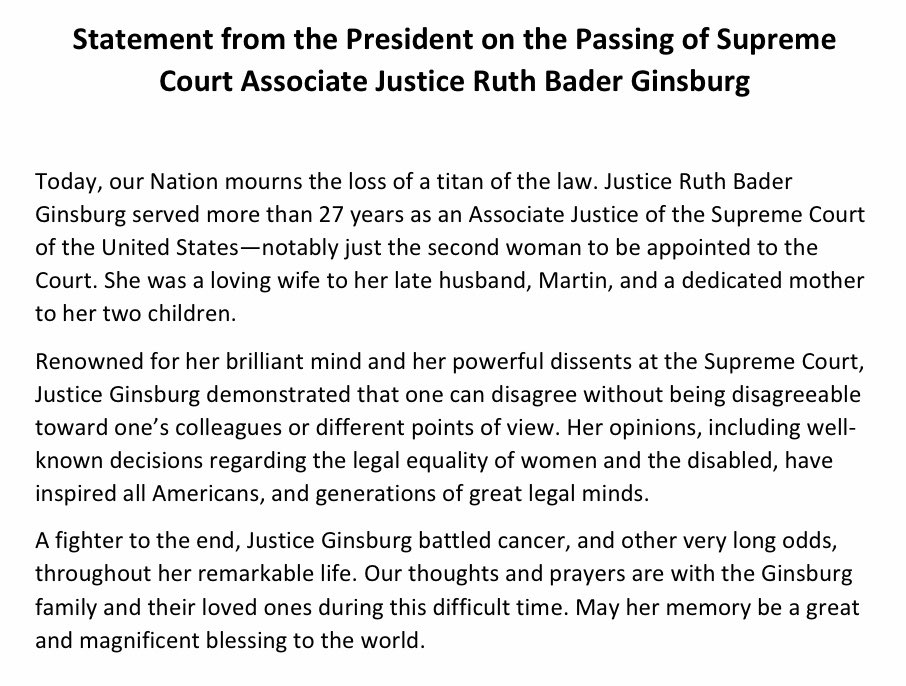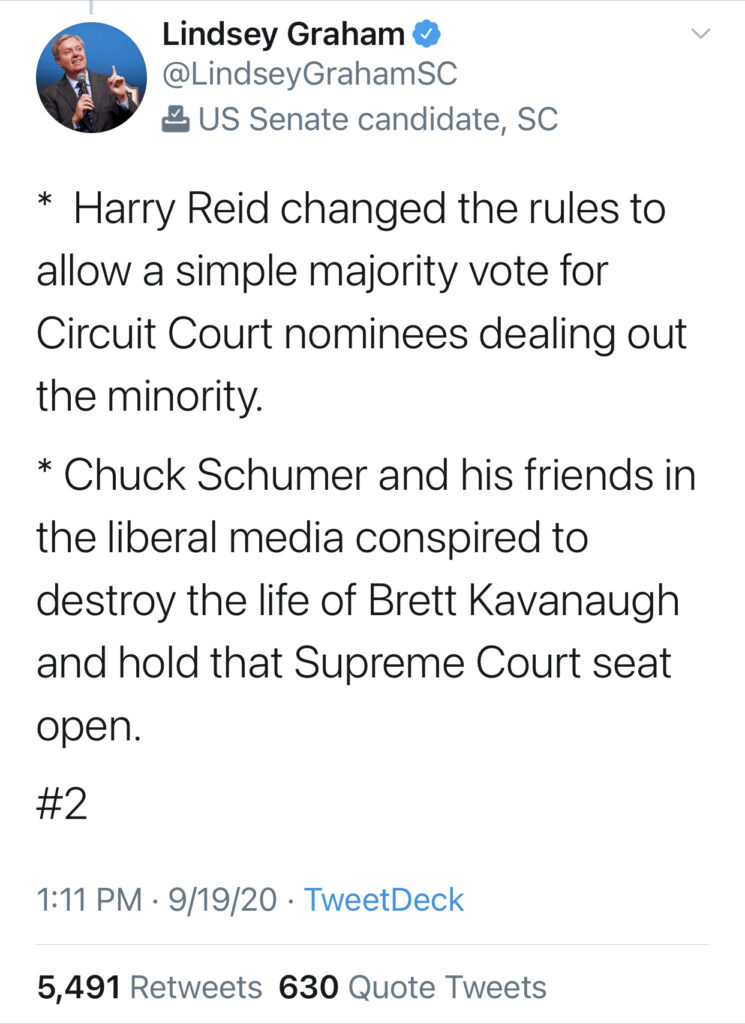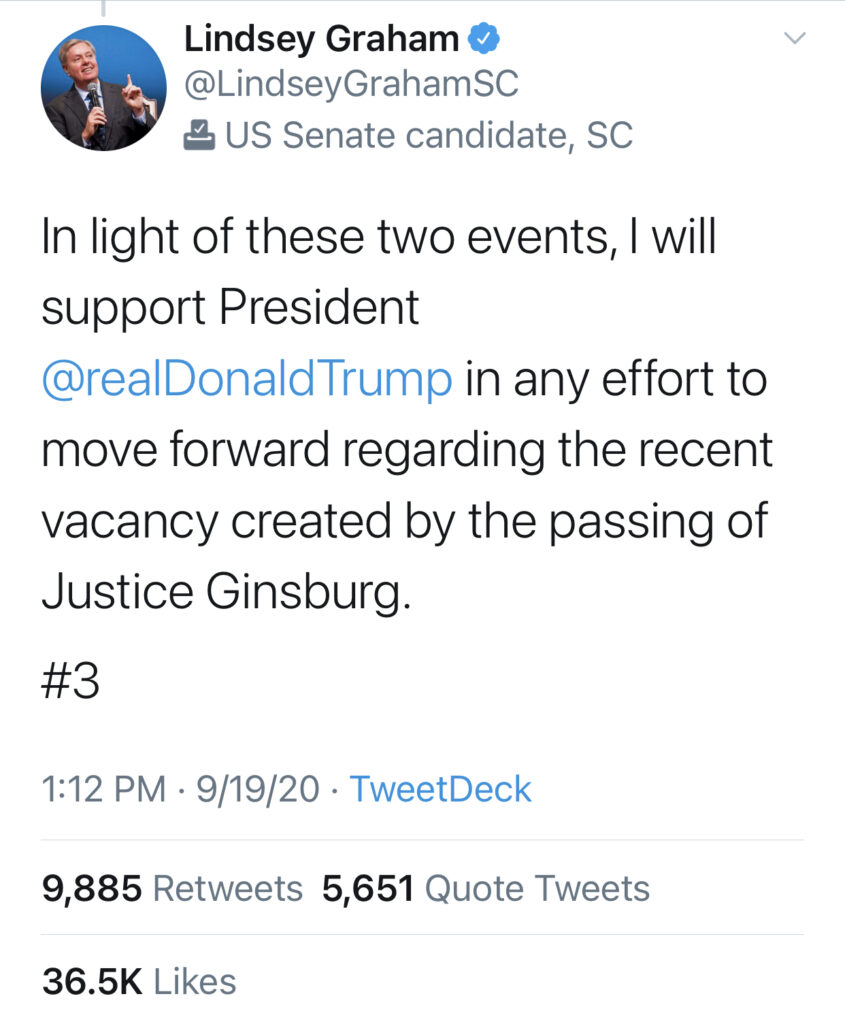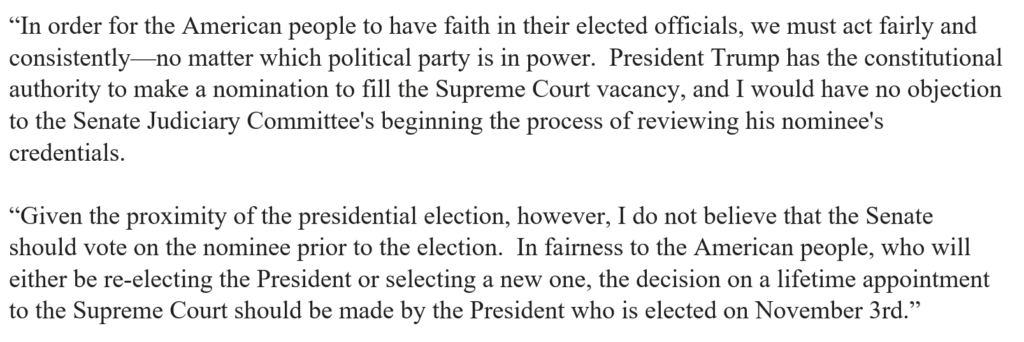On Feb. 13, 2016 – Supreme Court Justice Antonin Scalia died at a resort in Texas. His death sparked debate over a new nomination under the Obama administration, with prominent Republicans calling for the next president (not Obama) to make a nomination. As reported in the New York Times, former President Obama said he would nominate a new justice despite objections, and things did not go as planned. Just hours after the news broke during the Republican Presidential debate, the moderator, John Dickerson, questioned then candidate Donald J. Trump about what he would do if he were in President Obama’s position. Trump said that the death of Justice Scalia was a “tremendous blow to conservatism” and called on the Senate to halt any nomination by President Obama.
“It’s up to Mitch McConnell and everyone else to stop it! It’s called delay, delay, delay,” said Trump.
Trump stated that he would nominate “conservative judges” who have “a great reputation.” In which it was believed he was eying such conservative superstars as Diane S. Sykes, a federal appeals judge, who is now the Chief United States Circuit Judge of the United States Court of Appeals for the Seventh Circuit and former Justice of the Wisconsin Supreme Court.
Sykes is often described as “a moderate conservative.” Los Angeles Times’s David Savage describes Sykes as having “ruled in favor of religious employers who challenged President Obama’s healthcare law and its requirement to provide free contraceptives, and she voted to uphold Wisconsin’s voter ID law.”
President Trump also considered William H. Pryor Jr., also a federal appeals judge. Pryor is an Alabama-based judge on the U.S. Circuit Court of Appeals for the 11th Circuit and would be the only member of the Supreme Court who did a stint as a politician. It was during that time that he took some of his most notable positions on civil rights and discrimination cases. As Alabama’s twice-elected attorney general, Pryor defended the state’s practice of handcuffing prison inmates to hitching posts in the hot sun if they refused to work on chain gangs. A staunch defender of federalism, he filed an amicus brief in a Supreme Court case, Lawrence v. Texas, that ultimately invalidated state sodomy laws, arguing that “states should remain free to protect the moral standards of their communities through legislation that prohibits homosexual sodomy.”
On Sept. 18, 2020, the nation received breaking news from the Supreme Court that Supreme Court Justice Ruth Bader Ginsburg had died. While the nation mourns her passing, reflecting upon her career in law, Ginsburg’s passing gives President Trump the unexpected leverage he needs to radically remake the Supreme Court by replacing the liberal feminist icon with a far-right conservative.
President Trump’s official statement on Ginsburg’s passing was released on the White House website.

Should President Trump and the Republicans succeed in filling Ginsburg’s seat with a justice that mirrors the political stances and conservative values of his two other appointees to the court, Neil Gorsuch and Brett Kavanaugh, America will witness history in the making with the court’s most extreme ideological shift since President George H.W. Bush nominated Clarence Thomas, to replace legendary civil rights lawyer Thurgood Marshall in 1991.
A lot is at stake! Some cases for consideration are the affirmative action decision in Fisher v. University of Texas (affirmative action and racial diversity among students), Obergefell v. Hodges (legalized same-sex marriage), National Federation of Independent Business v. Sebelius (upheld most of Obamacare), and Women’s Health v. Hellerstedt.
The Republicans are pushing to fill Ginsburg’s seat with a more conservative choice, less than 100 days away from the November election cycle, during a global pandemic and after Senate Republicans prevented President Barack Obama from confirming a nominee to the court to replace the late Justice Scalia in 2016.
Former President Obama stepped forward to speak on the seriousness of this matter last Friday, calling on the Senate not to fill the Supreme Court vacancy created by the death of Ginsburg, urging Republicans to uphold the standard they set in 2016 by refusing to give a hearing to Merrick Garland.
“Four and a half years ago, when Republicans refused to hold a hearing or an up-or-down vote on Merrick Garland, they invented the principle that the Senate shouldn’t fill an open seat on the Supreme Court before a new president was sworn in. A basic principle of the law — and of everyday fairness — is that we apply rules with consistency, and not based on what’s convenient or advantageous in the moment. The rule of law, the legitimacy of our courts, the fundamental workings of our democracy all depend on that basic principle. As votes are already being cast in this election, Republican Senators are now called to apply that standard. The court’s decisions in the coming years are too consequential to future generations for courts to be filled through anything less than an unimpeachable process,” Obama said.
A quick recap — in 2016, Former President Obama nominated Garland after the late Justice Scalia’s death in February of that year. However, Republicans held it open until 2017, later confirming Justice Neil Gorsuch, Trump’s first Supreme Court nominee. Regarded as a moderate, Garland was often praised and highly respected by many influential Republicans, including influential senators such as Orrin Hatch of Utah. But before Obama could even fully name Garland as his pick, Senate Majority Leader Mitch McConnell declared any appointment by the sitting president to be “null and void,” stating that the next Supreme Court justice should be chosen by the next president — to be elected later that year.
“The American people should have a say in the court’s direction. It is a president’s constitutional right to nominate a Supreme Court justice, and it is the Senate’s constitutional right to act as a check on the president and withhold its consent,” McConnell said.
McConnell vowed following the news of Ginsburg’s death that President Trump’s nominee to replace Ginsburg on the Supreme Court will be put to the Senate floor for a vote, setting off a political firestorm over the future of the high court, and comp
U.S. Sen. John Thune (R-S.D.) issued the following statement on the passing of U.S. Supreme Court Justice Ruth Bader Ginsburg on his website:
“Justice Ruth Bader Ginsburg dedicated her life to serving the American people and the law. We didn’t always agree, but she was a true patriot who loved this country. Kimberley and I are praying for her family, friends, and colleagues during these difficult times. While tonight the nation rightly mourns, we’ll soon turn to the Senate’s constitutional role in this process. I believe Americans sent a Republican president and a Republican Senate to Washington to ensure we have an impartial judiciary that upholds the Constitution and the rule of law. We will fulfill our obligation to them. As Leader McConnell has said, President Trump’s Supreme Court nominee will receive a vote on the floor of the U.S. Senate.”
Sen. Lindsey Graham, (R-S.C.),
Do note that in 2018, Graham vowed to wait until the next election if an opening on the Supreme Court happened after the primaries. Graham’s exact words were “If an opening comes in the last year of President Trump’s term, and the primary process has started, we’ll wait until the next election.”
However, Graham has since had a change of heart, tweeting “The two biggest changes regarding the Senate and judicial confirmations that have occurred in the last decade have come from Democrats. First, Harry Reid changed the rules to allow a simple majority vote for Circuit Court nominees dealing out the minority. Second, Chuck Schumer and his friends in the liberal media conspired to destroy the life of Brett Kavanaugh and hold that Supreme Court seat open.”


Democratic nominee Joe Biden said Saturday that voters should decide who nominates the next Supreme Court justice to replace the vacancy left by Ruth Bader Ginsburg.
“The American people know the U.S. Supreme Court decisions affect their everyday lives,” Biden said in a statement. “The United States Constitution was designed to give the voters one chance to have their voice heard on who serves on the Court. That moment is now and their voice should be heard. The Senate should not act on this vacancy until after the American people select their next president and the next Congress,” said Biden according to thehill.com
Sen. Susan Collins, R-Maine, seconded Biden’s sentiments, confirming that she has “no objection” on the Senate Judiciary Committee’s initiating the process of reviewing nominee’s credentials, but she opposes a decision until after Nov. 3 in a letter released Saturday:

The current state of politics during this election cycle is nothing short of a powder keg waiting to explode. With the potential of an upcoming confirmation battle, following months of clashes over pandemic relief, combined with racially charged protest over police brutality and reform in the wake of nationwide racial unrest, is leaving the country at a crossroads of morality. Potentially creating an unnecessary
And that is if all American ballots casted will be fairly counted.




